Text
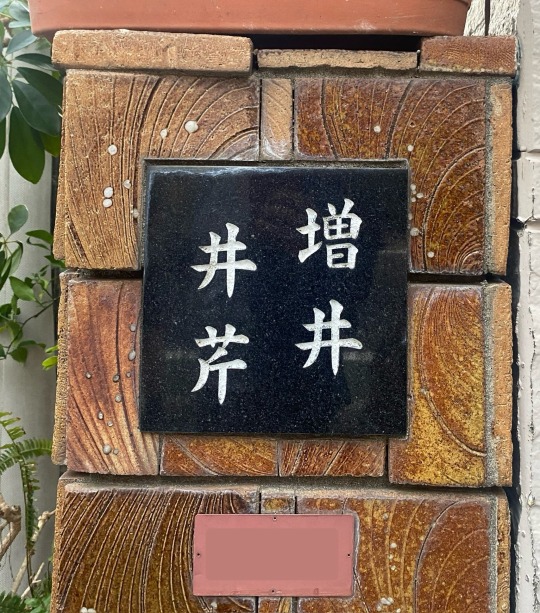
Double trouble today! The name 井芹 is usually Iseri or rarely Izeri, and 増井 is Masui or rarely Mashii.
I did wonder if it was one of those fancy two-way nameplates, but unfortunately, while 芹井 is a surname (read Serii), 井増 does not seem to exist. (You might even say...... いません.) Sorry :)
井, which both names share, is very common in surnames. It means well (as in a well water) or town/community. It's read い, セイ, or ショウ.
芹 is new to this blog! As the grass radical 艹 suggests, it's a herb, called seri or Japanese parsley. It's read せり or キン, the latter of which it shares with its other radical 斤, meaning axe.
増 means to increase, add, augment, gain, or promote. It's read ま.す, ま.し, ふ.える, ふ.やす, or ゾウ, the last of which it shares with its right radical, 曽, which means formerly, ex-, once, before, or ever/never.
26 notes
·
View notes
Text
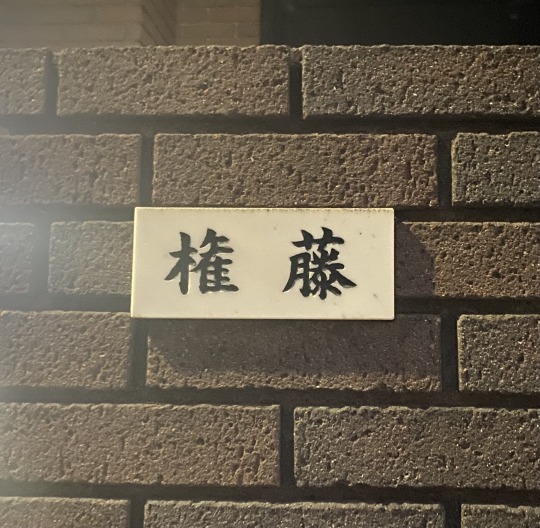
Another wisteria name today! And one I'd never seen before. But the name 権藤 is usually read Gondō, with potential for Gonfuji, Gotō, Kondō, Kenfuji, or Kendō.
権 is most often read ケン, but it can also be おもり, かり, はか.る, or ゴン. It means rights, authority, or power. Specifically, look out for it as a suffix, as in 人権 [じんけん] human rights, 選挙権 [せんきょけん] the right to vote, or 著作権 [ちょさくけん] copyright.
藤, as we covered yesterday, is read ふじ, トウ, or ドウ. It means wisteria.
18 notes
·
View notes
Text

A very cool stylized sign today! The name 藤山 is usually read Fujiyama, sometimes Tōyama. (Not to be confused with Mt. Fuji, which is written 富士山 and is almost always read ふじさん but can be ふじやま in some contexts.)
藤 means wisteria. It’s read ふじ, トウ, or ドウ.
山 means mountain, though here it looks like a crown. It's read やま, サン, or セン.
25 notes
·
View notes
Text
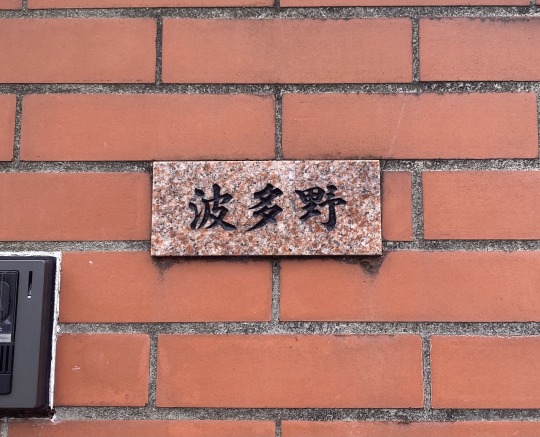
A three-character surname today! 波多野 is usually read Hatano, rarely Hadano, and even more rarely Namitano or Kitano.
波 means wave or billows. It refers not only to ocean waves (as hinted by the water radical 氵) but also to electric, sonic/ultrasonic, radio, brain, and heat/cold waves, and wavelengths. (Maybe other waves too but that's all the waves I can think of now.) It's read なみ or ハ.
多 means many/much or frequent. It’s read おお.い, まさ.に, まさ.る, or タ.
野 means plains, field, rustic, or civilian life. It’s read の, ヤ, or ショ. It's also the only kanji in this post that is not the source of any modern kana characters: the hiragana は is derived from 波 and the katakana タ from 多.
14 notes
·
View notes
Text

Another moon name today! 月崎 is read Tsukizaki or Tsukisaki. Both characters are quite common, but the name only belongs to about 310 people nationwide.
月, as we reviewed yesterday, means moon or month. It’s read つき, ゲツ, or ガツ.
崎 means promontory, cape, or spit. It’s read さき, さい, みさき, or キ. It has one radical that hints at the meaning (山 means mountain) and one that provides a reading (奇 is also read キ).
48 notes
·
View notes
Text
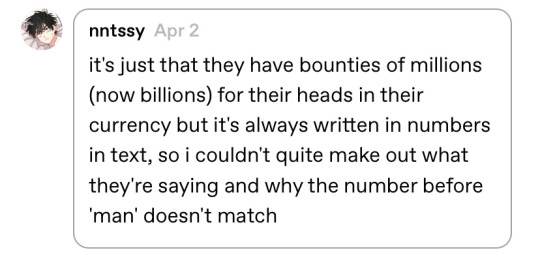
@nntssy thank you! That makes sense now that I hear it :)
When you get to big numbers, the Japanese counting system starts to differ from English. I am not a numbers person, so when I have numbers in my work, I double check constantly. Usually I use on SLJ FAQ, but today I used Jisho and I found this interesting hiccup.

The second suggestion is fine! 2000万 [にせんまん] does mean 20,000,000. It does NOT, however, mean 平成12年 [へいせいじゅうにねん], or the year 2000. (More about the years thing here.)
To get into it, 万 means 10,000. It's usually read マン or バン, but sometimes it's よろず. We've covered its archaic form 萬, and you probably know the exclamation 万歳 banzai. It literally means eternal life and prosperity, but in practical use, it means "Hooray!," to cheer, or the gesture of throwing one's hands up (in either celebration or defeat... or, you know, on a roller coaster or whatever).
But as a number, it also happens to be where the counting system starts to change. Let me borrow a graphic:
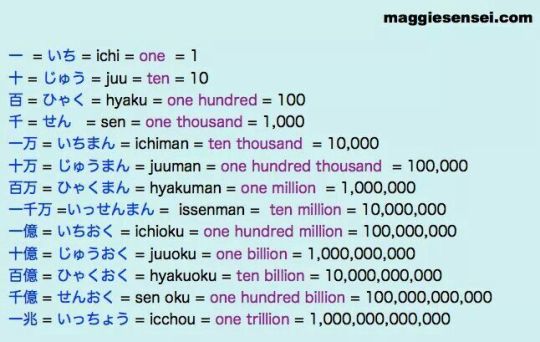
Yuck. Maybe you're saying, "Well, these are big numbers, I'm not gonna encounter them that often," I am very sorry to tell you that the yen is counted in CENTS, so if something costs $10, its price is four figures. And with current exchange rates, 10K comes into play around the $66 mark. So you have to learn the big numbers, even if you hate it! Sorry!
141 notes
·
View notes
Text

What a pretty name! 香月 is usually Katsuki (as it is here), but in rare cases, it can also be Kazuki, Kōtsuki, Kōzuki, Kagetsu,or Kōgetsu. It can also be a female given name.
香 means smell (usually a pleasant aroma), perfume, or incense. It’s read か, かお.り, かお.る, コウ, or キョウ.
月 means moon or month. It’s read つき, ゲツ, or ガツ.
35 notes
·
View notes
Text

Ooh, can someone elaborate?
When you get to big numbers, the Japanese counting system starts to differ from English. I am not a numbers person, so when I have numbers in my work, I double check constantly. Usually I use on SLJ FAQ, but today I used Jisho and I found this interesting hiccup.

The second suggestion is fine! 2000万 [にせんまん] does mean 20,000,000. It does NOT, however, mean 平成12年 [へいせいじゅうにねん], or the year 2000. (More about the years thing here.)
To get into it, 万 means 10,000. It's usually read マン or バン, but sometimes it's よろず. We've covered its archaic form 萬, and you probably know the exclamation 万歳 banzai. It literally means eternal life and prosperity, but in practical use, it means "Hooray!," to cheer, or the gesture of throwing one's hands up (in either celebration or defeat... or, you know, on a roller coaster or whatever).
But as a number, it also happens to be where the counting system starts to change. Let me borrow a graphic:

Yuck. Maybe you're saying, "Well, these are big numbers, I'm not gonna encounter them that often," I am very sorry to tell you that the yen is counted in CENTS, so if something costs $10, its price is four figures. And with current exchange rates, 10K comes into play around the $66 mark. So you have to learn the big numbers, even if you hate it! Sorry!
141 notes
·
View notes
Text

@shreeky any excuse to talk about my dog! Here is the boy himself! Insisting I keep the door open so he can gaze longingly outside and contemplate his kingdom.


He is generally not a successful hunter, but he did once catch a beetle after stalking it for ages. He took a single bite, then spit the mangled corpse out in disgust and looked up at me reproachfully, as if to say, “How could you let me eat something like that?”
He didn’t stop chasing bugs, but now he does it with less élan. He mostly snaps at the air around them—maybe because he doesn’t want to eat them so much as to scare them off, or maybe because (we think) he might not see super well. He had a rough start to life and still has a lot of difficulties but he is a perfect child and we love him so much.
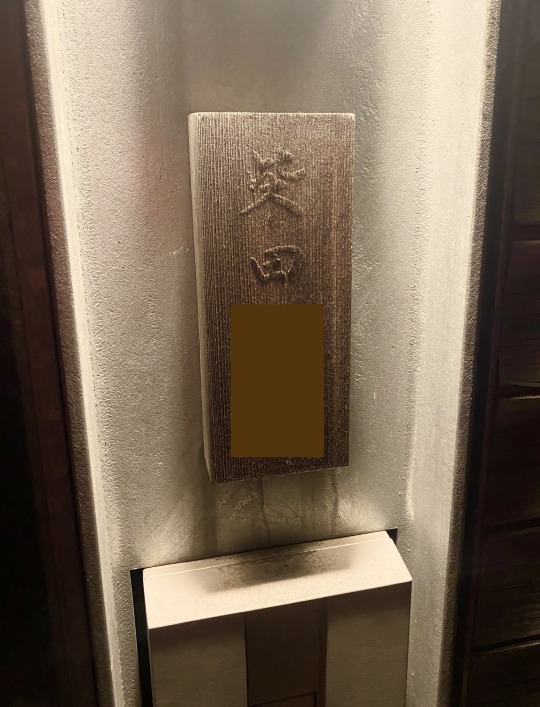
Here's one that gave me some trouble! On the old wood, I kept seeing the first kanji as 木 tree topped with a ⺮ bamboo crown, but no such character exists! The top radical is actually 此 (archaic but it means "this" or "current"; it's the こ in この・ここ・これ). The name is 柴田 Shibata (or rarely Shida, Shiba, Shihada, or Shinoda).
柴 is read しば, サイ, or シ. It means brushwood or firewood. You probably know it from the dog breed 柴犬 [しばいぬ or しばけん] Shiba Inu. The name comes from their use in hunting, to flush game out of the brush.
田 is read た or デン. It means rice field or rice paddy.
(FWIW, my Shiba mix has *zero* drive to hunt small animals. He might actually be scared of them. Straight up pretends he can't see them, even cats and rats and giant toads. He will absolutely hunt a bug though. And he is very ineffective at it! Which is good because I don't want to deal with what happens if he should ever catch that bee.)
#although i guess to drive the game out#you don’t have to be a hunter;#the game just has to be scared of you
61 notes
·
View notes
Text
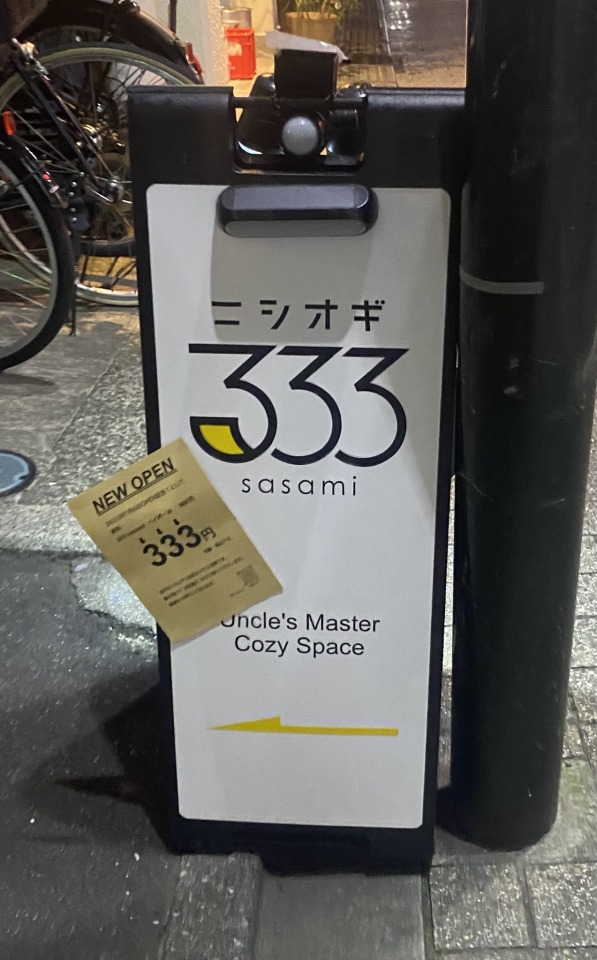
A cute little dining bar name! It's called ニシオギ 333 or Nishi Ogi Sasami. The Nishi Ogi part refers to a neighborhood (西荻窪 Nishi Ogikubo, home of this beautiful mural). Sasami can be either a surname like 佐々見 or 笹見, or a given name (usually female) written any number of ways.
三 means three, and it's read み, み.つ, みっ.つ, サン, or ゾウ. But in names (and ateji, puns and other wordplay), it can also be read サ. Here, the first two 3s are read サ and the last one is ミ, creating a recognizable name out of a series of numbers! Pretty neat.
Also, ササミ or ささ身 means chicken tender. It was originally written 笹身, with 身 referring to meat and 笹 meaning bamboo grass or broad-leaf bamboo. The name comes from the resemblance to the leaves of the plant.
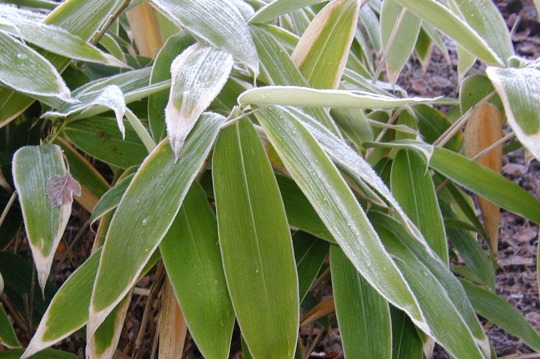
I can kinda see it!
#number names#learning japanese#i am struggling to remember any other tags#guys i think i might be truly exhausted
48 notes
·
View notes
Text

Today's nameplate is a threefer! The first name is 本多 Honda or sometimes Honta. (Not to be confused with the automaker 本田 Honda.)
本 means book, main, origin, true, or real/genuine. It’s read もと or ホン. More here on its use as a counter for long things.
多 means many, frequent, or much. It's read おお.い, まさ.に, まさ.る, or タ. It's also the source for katakana タ.
The second is 尾上, usually Onoue or Onoe. It can also potentially be Ogami or Oue.
尾 means tail, end, or the lower slope of a mountain. It's sometimes used to count fish. It's read お or ビ.
上 means up, above, or raise. It has about a billion readings! Do what you can to remember them.
The third is 菊見 Kikumi, which is pretty but quite rare. There are only about 110 people with this name!
菊 means chrysanthemum (which is the family crest of the Imperial family). It's read キク.
見 means see, to be visible, or to show. It can also refer to opinions, hopes, or chances. It's read み or ケン.
31 notes
·
View notes
Text

Here's one that gave me some trouble! On the old wood, I kept seeing the first kanji as 木 tree topped with a ⺮ bamboo crown, but no such character exists! The top radical is actually 此 (archaic but it means "this" or "current"; it's the こ in この・ここ・これ). The name is 柴田 Shibata (or rarely Shida, Shiba, Shihada, or Shinoda).
柴 is read しば, サイ, or シ. It means brushwood or firewood. You probably know it from the dog breed 柴犬 [しばいぬ or しばけん] Shiba Inu. The name comes from their use in hunting, to flush game out of the brush.
田 is read た or デン. It means rice field or rice paddy.
(FWIW, my Shiba mix has *zero* drive to hunt small animals. He might actually be scared of them. Straight up pretends he can't see them, even cats and rats and giant toads. He will absolutely hunt a bug though. And he is very ineffective at it! Which is good because I don't want to deal with what happens if he should ever catch that bee.)
61 notes
·
View notes
Photo
Oh! This is what I was saying yesterday!
万歳 [ばんざい]
banzai; hurray; hurrah; hooray (a celebratory cheer, usu. while raising both arms in the air)
something to cheer about; something worthy of celebration
giving up; throwing one's hands up (Only applies to ばんざい)
eternal life and prosperity
万 means 10,000. It's read マン, バン, or よろず.
歳 is the counter for years of age. It can also mean year-end, occasion, or opportunity. As a counter, it's read サイ, but in other contexts, it can be とし, とせ, よわい, or セイ.
Bonus: Because 歳 is complicated to write and isn't taught until junior high, kids often write 才 instead. Its only reading is サイ.

One of my favorite PokeStops: a statue of a giant naked baby with his hands over his head (in the banzai 万歳 gesture).
#reblogging myself#hey tumblr safe mode - have a naked baby!#(i think i got flagged for this image last time - let's see!)#learning japanese#no names just vibes#万#歳#才
40 notes
·
View notes
Text
When you get to big numbers, the Japanese counting system starts to differ from English. I am not a numbers person, so when I have numbers in my work, I double check constantly. Usually I use on SLJ FAQ, but today I used Jisho and I found this interesting hiccup.

The second suggestion is fine! 2000万 [にせんまん] does mean 20,000,000. It does NOT, however, mean 平成12年 [へいせいじゅうにねん], or the year 2000. (More about the years thing here.)
To get into it, 万 means 10,000. It's usually read マン or バン, but sometimes it's よろず. We've covered its archaic form 萬, and you probably know the exclamation 万歳 banzai. It literally means eternal life and prosperity, but in practical use, it means "Hooray!," to cheer, or the gesture of throwing one's hands up (in either celebration or defeat... or, you know, on a roller coaster or whatever).
But as a number, it also happens to be where the counting system starts to change. Let me borrow a graphic:

Yuck. Maybe you're saying, "Well, these are big numbers, I'm not gonna encounter them that often," I am very sorry to tell you that the yen is counted in CENTS, so if something costs $10, its price is four figures. And with current exchange rates, 10K comes into play around the $66 mark. So you have to learn the big numbers, even if you hate it! Sorry!
#learning japanese#life in japan#i am so. uncomfortable with numbers#i checked this at least 百万回 and i am SURE there still have to be errors#and i didnt even make the graphic.......#what a nightmare
141 notes
·
View notes
Text
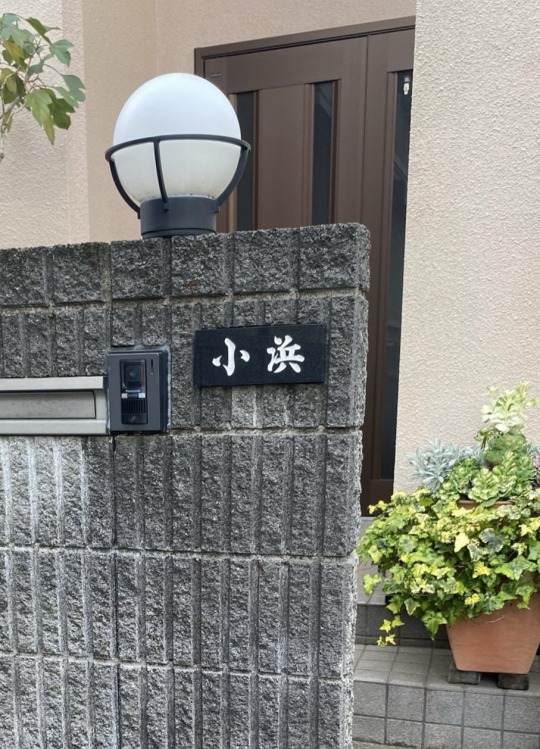
If I told you this was the name of a former US president, would you believe me? Also, my dog, who is terrified of everything and everyone, took a sudden detour on his little walk to try and go up these peoples' stairs to their door, so maybe he can read it. Can you?
The name 小浜 is usually read Kohama, but it can also be read Obama(!) or Ohama.
If this sounds familiar, a while back we covered a version of this name that, instead of the jōyō kanji 浜, uses the archaic variant 濱 (which only appears in proper nouns). That version is less common; there are only about 1,900 小濱s in the country, as opposed to 13,000 小浜s.
小 means little or small. It's read ちい.さい, こ-, お-, さ-, or ショウ.
浜 (or 濱) means beach, seashore, or seacoast. It's read はま or ヒン. Its components are the water radical氵and soldier 兵, which itself is made up of 斤 axe, 一 one, and 八 eight...
So, a soldier using an axe to chop one thing into eight pieces? Hmm. Maybe a better mnemonic would be to better to picture the 八 as feet and visualize a soldier as a walking axe. I don't know why adding water to that would make a seashore; just please remember that it does, and you're golden.
26 notes
·
View notes
Text
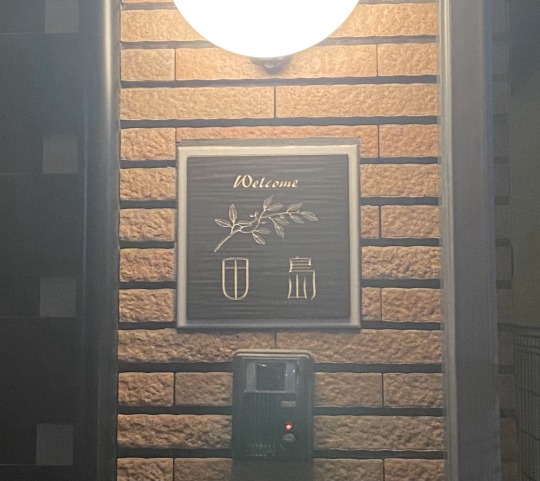
The return of the long spidery font! I love how it's bottom-heavy and yet so light. Anyway, the surname 田島 is read Tajima.
田 means rice paddy. It’s read た or デン.
島 means island. It’s read しま or トウ.
28 notes
·
View notes
Text
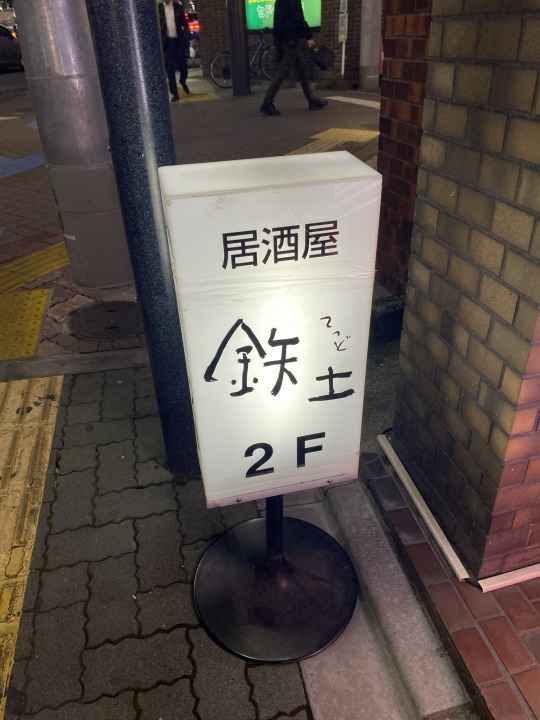
Some scrawly calligraphy! I like it. The name 鉄土 (read テッド) is pretty unusual. I was wondering what the deal is and I found this incredibly intriguing passage in a review:
ちなみにお店の名前は鉄土と書いて「テッド」のようです。
英語から来ているようですが、詳細はマスターから聞きましょう。(絶対想像はできません)
By the way, the shop name is written 鉄土 and read テッド. Apparently it comes from English, but you should ask the bartender what it means for yourself. (There's no way you'll ever guess.)
Huh! Very compelling. I'm assuming it's Ted (though who can never be sure)...... but why? Guess I'll have to investigate for myself. Anyway!
鉄 is read くろがね or テツ. Its literal meaning is iron, but it also often refers to trains/railways. This comes from 鉄道 [てつどう] railroad or rail transport.
土 is read つち, ト, or ド. It means soil, earth, or ground. Be aware of the relative lengths of the horizontal lines so you won't confuse it with 士, meaning gentleman/scholar. (Mnemonic: The ground has to be big enough to stand on, so it needs a longer bottom line. Also, to be a gentleman, you need to have a small bottom.)
27 notes
·
View notes